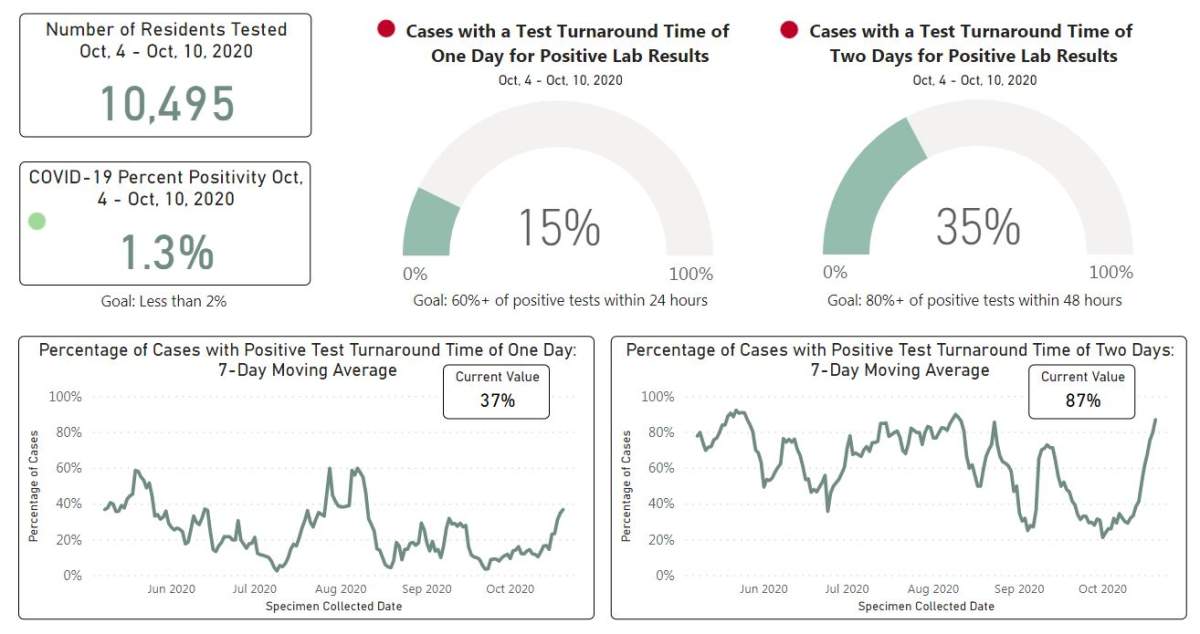It’s a spot we don’t want to be in — more shutdowns in the region.

“That impacts people’s personal liberties,” says Durham’s chief medical officer of health, Dr. Robert Kyle.
“Shutting down the economy has huge impacts in terms of people’s livelihoods.”
With coronavirus cases slowly climbing weekly and several indicators trending in the wrong direction, Durham health says people need to be careful.
“There is some disturbing trends in terms of viral spread and containment,” says Kyle. “We’re doing our best in terms of contact management.”
According to Durham Region’s COVID-19 tracker, Durham is sitting at more than 170 active cases — a steep climb in recent weeks, with an average of 30 new cases a day.
“It struck us that was the best step to take is to double down on our messaging,” Dr. Kyle told Global News. “This is to try and prevent any further spread to the extent possible.”
“This is especially important with Halloween fast approaching.”
According to the Ministry of Health, a region must keep certain indicators related to COVID-19 within a particular range. Durham is not meeting a number of its targets on this front — particularly when it comes to turnaround times for positive test results.

Get breaking National news
According to the region, only about 15 per cent of individuals who test positive are being told they’ve contracted the virus within 24 hours — its goal is 60 per cent. Just 35 per cent of positive cases have a turnaround time of two days, when Durham health’s goal is 80.
Dr. Kyle says because of the reopening of schools, the spread of the virus is becoming more prominent.
“We’re seeing outbreaks in a number of different settings — of course, child-care centres, schools, congregate living centres, long-term care homes,” he said.
As health agencies worry about who could be put back into a modified Stage 2 next, some believe it should be the last resort.
“You don’t want to have a yo-yo strategy,” says Jean-Paul R. Soucy, a PHD student at the University of Toronto. “This is where you kind of you see accelerating cases, then they bring things under control again, and open back up.”
Soucy studies epidemiology and is also the co-founder of the COVID-19 Canada Open Data Working Group. They collect publicly available data about the pandemic, monitoring how the country is handling the outbreak.
He says there are better ways to isolate the problem than shutting down the economy every time there’s a spike in numbers.
“All sorts of countries have made very effective use of this test, trace, isolate strategy to keep their cases under control,” says Soucy.

“What you want to have is a really fast turnaround time so you can identify people who become infected and keep them isolated for a period of time.”
Durham’s Health’s Dr. Kyle says the region hasn’t had any conversations with public health but just wants people to be mindful of where the region stands. He agrees that closing down again may not be the best strategy, and says to avoid this, residents need to continue following public health measures to ensure the region does not have to go into Stage 2 again.


_848x480_1397405763961.jpg?h=article-hero-560-keepratio&w=article-hero-small-keepratio&crop=1&quality=70&strip=all)




Comments
Want to discuss? Please read our Commenting Policy first.